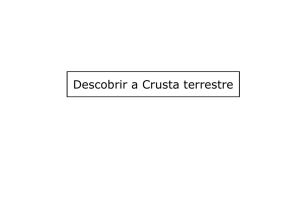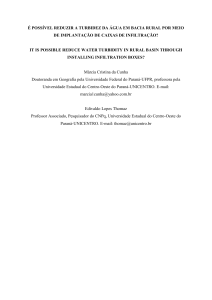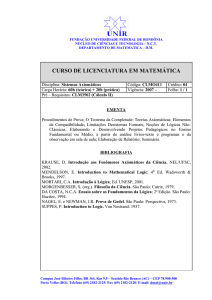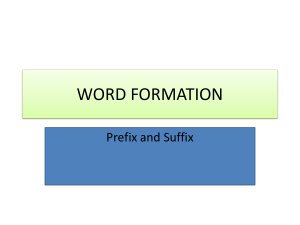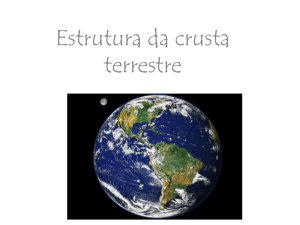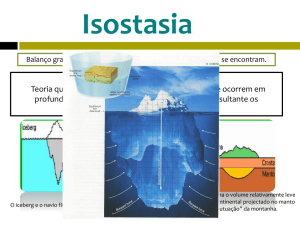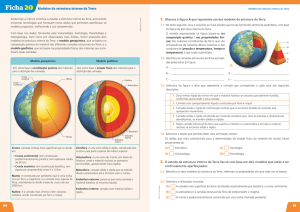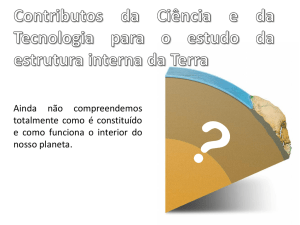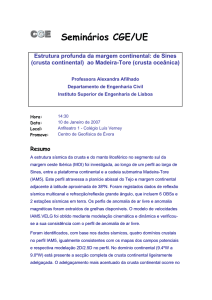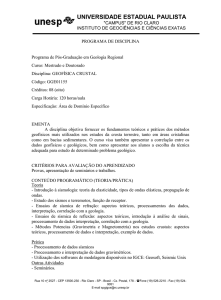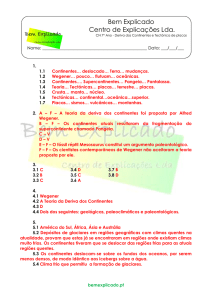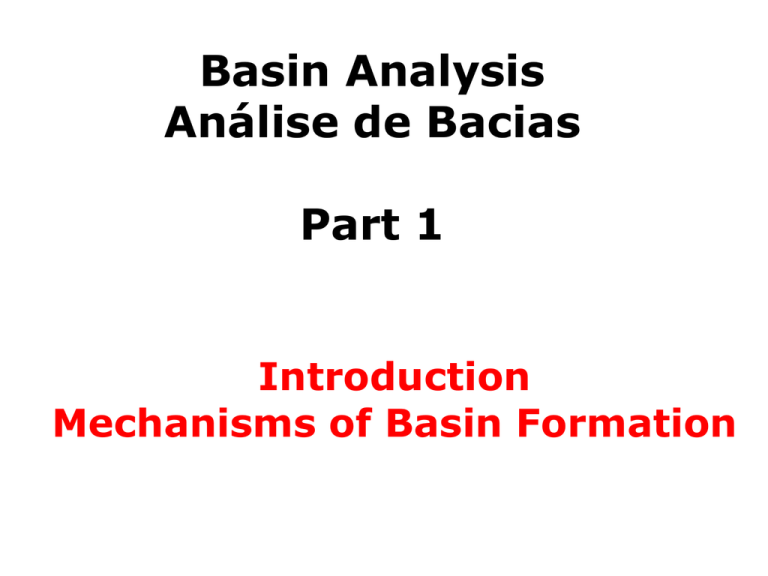
Basin Analysis
Análise de Bacias
Part 1
Introduction
Mechanisms of Basin Formation
Basin Analysis
•
•
•
•
•
Introduction
Mechanisms of Basin Formation
Basin Classification
Basins and Sequence Stratigraphy
Summary
Introduction
Basin analysis - Study of sedimentary
rocks to determine:
• Subsidence history
• Stratigraphic architecture
• Paleogeographic evolution
Tools:
Geology (outcrops, wireline logs, core)
Geophysics (seismic, gravity, aeromag)
Computers (modeling, data analysis)
FORÇAS E ORDENS DE RELEVO
Shaping the world
FORÇAS QUE MODELAM A TERRA
ENDÓGENAS
TERRA
EXÓGENAS
UM PLANETA DINÂMICO
FORÇAS E ORDENS DE RELEVO
ORDENS DE RELEVO
3
MODELADOS /bacias sedimentares
2
PLACAS TECTÓNICAS
1
CONTINENTES
BACIAS OCEÂNICAS
PRIMEIRA ORDEM DE RELEVO
First approach
CONTINENTES
E
BACIAS OCEÂNICAS
Morfologia submarina no Atlântico
Planície abissal Ibérica
Depocentros actuais
Actual depocenters
Planície abissal Portuguesa
( Perfil Sísmico LUSIGAL)
PRIMEIRA ORDEM DE RELEVO
CONTINENTES
E
BACIAS OCEÂNICAS
Morfologia Submarina
Vida no meio marinho
PLACAS
TECTÓNICAS
Rever o Tema 5
SEGUNDA ORDEM DE RELEVO
Second approach
TERCEIRA ORDEM DE RELEVO
MODELADOS
Quais são os agentes modeladores?
Agents ? Energy?
•
•
•
•
•
•
•
•
•
Gravidade
Águas pluviais e de escorrência
Cursos de água
Lagos
Glaciares
Vento
Mar
Águas subterrâneas
Seres Vivos (incluindo o Homem)
Factores intervenientes no ciclo
evolutivo das rochas
External Geodinamics
Introduction
What is a basin?
• Repository for sediment
• Formed by crustal subsidence relative
to surrounding areas
• Surrounding areas sometimes uplifted
• Many different shapes, sizes and
•mechanisms of formation
Introduction
Zonation of the Earth-Composition
• Crust
• Mantle
• Core
See other revision presentation on
this subject!
PRINCIPAIS TIPOS DE CRUSTA
A crusta ou crosta terrestre constitui a parte rígida superior da litosfera, na base
da qual se define uma descontinuidade sísmica de primeira ordem –
Descontinuidade de Mohorovicic ou Moho (linha vermelha). Consideram-se
três tipos principais de crusta:
Oceânica
Transicional
Continental
PRINCIPAIS TIPOS E SUBTIPOS DE CRUSTA
Área aflorante
(inclui domínio
oceânico)
Volume da crosta
Os 3 tipos principais de crosta são habitualmente divididos em 13 subtipos
Cada subtipo representa uma porção de crusta com características
geológicas e geofísicas próprias
Escudos e Plataformas
Orógeno de colisão
Arco vulcânico insular
Arco de margem
continental
Bacia oceânica
Rifte continental
Plateau oceânico
Cordilheira oceânica
Introduction
Zonation of the Upper Earth –Rheology
Lithosphere
Rigid outer shell
Crust and upper mantle
Asthenosphere
Weaker than lithosphere
Flows (plastic deformation)
COMPORTAMENTOS
MECÂNICOS DA CROSTA
Comportamento frágil ou rígido
Mechanical behaviour of
the crust
Comportamento plástico
O comportamento da crusta continental sujeita a esforços está dependente da
temperatura e da duração de aplicação dessas tensões. Quanto mais quente
estiver a crusta mais esta se comportará como um sólido dúctil que se deforma
plasticamente; por outro lado crustas frias tendem a ter um comportamento mais
elástico, observando-se frequentemente fracturas e deslizamentos por fricção.
TRANSIÇÃO
FRÁGIL – DÚCTIL
(TFD)
Mais aspectos desta
transição em
“Deformação e Orogénese”
Tensões máxima (σ1) e mínima (σ3)
Como a temperatura da crosta aumenta com a profundidade, observa-se uma
mudança de comportamento, relativamente à deformação, de frágil para dúctil,
uma vez ultrapassado um determinado limite. Esta transição frágil-dúctil ocorre
apenas a cerca de 20 km de profundidade nos riftes pois aí o fluxo de calor é
muito grande.
Nos escudos pré-câmbricos, relativamente frios, a
transição frágil-dúctil ocorre a uma profundidade
superior a cerca de 30 km.
A base reológica da litosfera, correspondente ao valor
estipulado de cerca de 1MPa = log(σ1-σ3) de
resistência à rotura, ocorre a 55 km nas zonas de rifte e
a 115 km nas zonas dos escudos pré-câmbricos.
Introduction
Zonation of the Upper Earth –Rheology
VERTICAL MOTIONS (subsidence, uplift)
in sedimentary basins
are primarily in response to deformation
of lithosphere and asthenosphere
Introduction
Plate motions
Plate-plate interactions can
vertical crustal movements
generate
We will examine basins according to their
positions with respect to plate boundaries
and plate-plate interactions
“Wilson Cycle” – opening and closing of
ocean basins (See revision presentation)
Introduction
Three types of plate boundaries:
Divergent – plates moving apart Mid- ocean
ridges, rifts
Convergent – plates moving towards each
other Subduction zones
Conservative – plates move parallel to each
other Strike-slip systems
Mechanisms of Basin Formation
Como se formam as bacias?
Major mechanisms for regional
subsidence(subsidência)/uplift(soerguimento):
Isostatic
–
changes
lithospheric thickness
in
crustal
or
Loading (sobrecarga) – by thrust sheets,
volcanic piles, sediment
Dynamic effects – asthenospheric flow,
mantle convection, plumes
Mechanisms of Basin Formation
Isostatic Processes:
Crustal thinning
Extensional stretching, erosion during
uplift, magmatic withdrawal
Mantle-Lithosphere Thickening
Cooling of lithosphere, following cessation
of stretching or cessation of heating
Pesquisar ISOSTASIA
Mechanisms of Basin Formation
Isostatic Processes:
Crustal densification
Density increase due to changing
pressure/temperature
conditions
and/or emplacement of higher
density melts into lower density
crust
Mechanisms of Basin Formation
Loading (sobrecarga):
• Local isostatic compensation of crust
and regional lithospheric flexure
• Dependent on flexural rigidity of
lithosphere
Mechanisms of Basin Formation
Loading:
Sedimentary or Volcanic Loading
Tectonic loading
During overthrusting and/or underpulling
Subcrustal loading
Lithospheric flexure during underthrusting of
dense lithosphere
Mechanisms of Basin Formation
Dynamic effects:
Asthenospheric flow
Descent or delamination of subducted
lithosphere
Mantle convection
Plumes

